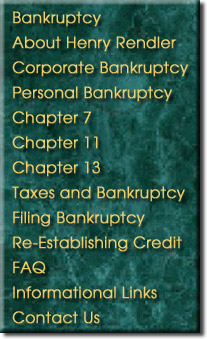
|
||||
| |
||||
|
|
||||
|
As a general proposition, older income taxes (more than 3
years old) can be wiped out in bankruptcy;
newer income taxes (less than 3 years old) cannot. A debtor/employer
can wipe out the employer's portion of older, but not newer, payroll
taxes. The dischargeibility of state and local, such as sales and
use taxes, will depend upon their true nature, i.e., whether they
are excise or withholding taxes. The trust fund portion of payroll
taxes is generally not dischargeable. Prior to
filing bankruptcy, the debtor should have his own particular tax
situation assessed.
Test for Wiping Out Income Taxes The Test for wiping out income taxes in Chapters 7 & 11 include:
In Chapter 13, income taxes can be wiped out if the return was due more than 3 years prior to the filing, and was assessed at least 240 days prior to the filing. In some cases, the tax may be dischargeable even if not assessed prior to the filing. Income Tax Liability Under the Internal Revenue Code, as a general rule, forgiveness of indebtedness constitutes income to the debtor. However, there is an exception where the debtor receives a discharge in bankruptcy.
Filing Returns After Bankruptcy As a general rule, debtors filing bankruptcy continue to complete their own returns and pay their own post-bankruptcy taxes. However, in instances where a bankruptcy trustee is appointed, and assets are liquidated and monies paid to creditors, the trustee may be responsible for the preparation of a tax return. Debtors should therefore consult their own tax professionals about their own particular tax situations. Liens A priority tax can also be a secured claim, if the entity has duly recorded a tax lien. If a priority tax claim has secured status as well, then in a Chapter 13 as well as Chapter 11, the claim would be entitled to interest. Also, even if a tax is otherwise non-priority, and therefore dischargeable, the tax entity has the right to enforce its lien rights. Contacting Us If you would like more information concerning bankruptcy or other related legal matters in the State of California, Attorney Henry Rendler is available for consultation. Please feel free to call 408.293.5112 to set up an appointment.
|

|
|||
|
|
||||
